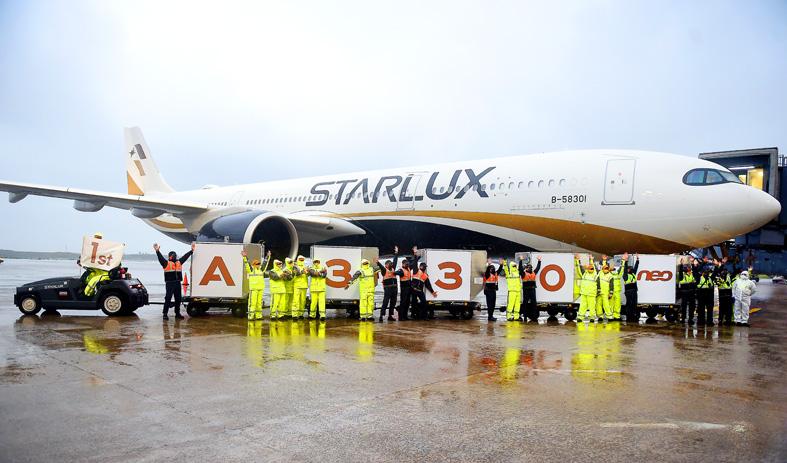Start-up Starlux Airlines Co (星宇航空) earlier this month had a fresh capital injection of NT$4 billion (US$136.94 million) at the request of the country’s top aviation regulator, after the airline reported a net loss of NT$3.01 billion for the whole of last year.
Ninety percent of the NT$4 billion came from Starlux chairman Chang Kuo-wei (張國煒) and the other 10 percent from other major shareholders and StarLux employees, the airline said in a statement yesterday.
Starlux said it would continue to review whether more capital is needed.

Photo: Chu Pei-hsiung, Taipei Times
The injection brought the airline’s paid-in capital to NT$15.36 billion, company data showed.
Starlux, which was established in 2018 and offered its first flight in January 2020, has had a bumpy ride because of the COVID-19 pandemic — it reported an aggregate net loss of NT$5.4 billion over the past two years, the largest loss among local airlines, data released by the Civil Aeronautics Administration (CAA) showed.
Late last year, the CAA required the airline to increase its capital because its accumulated losses totaled NT$6.93 billion, more than half of its paid-in capital of NT$11.36 billion.
Unlike other airlines that have shifted to air cargo to offset the loss in passenger revenue during the COVID-19 pandemic, Starlux’s cargo capacity is limited, as it only operated six single-aisle Airbus A321neo planes last year, company data showed.
However, the airline said it still tried to increase its revenue by shifting its flights to destinations with stable passenger demand, as well as cities that are hubs for cargo operations, it said.
Starlux’s revenue last year totaled NT$795 million, doubling from a year earlier and ranking fifth in Taiwan, after China Airlines (CAL, 中華航空), EVA Airways Corp (長榮航空), Uni Airways Co (立榮航空) and Mandarin Airlines (華信航空), CAA data showed.
Starlux’s growth in revenue is the highest among local airlines, followed by CAL’s 24 percent rise and EVA Airways’ 20 percent increase, the CAA data showed.
However, Starlux’s net assets per share last year stood at NT$3.96, the lowest among local airlines, while its debt ratio was 82 percent, the second-biggest after Daily Air Corp’s (德安航空) 87 percent, the data showed.
The airline said it plans to receive more A321neo jets and A330neo planes this year to expand its capacity on the expectation that air travel would recover as countries ease their border controls.

MULTIFACETED: A task force has analyzed possible scenarios and created responses to assist domestic industries in dealing with US tariffs, the economics minister said The Executive Yuan is tomorrow to announce countermeasures to US President Donald Trump’s planned reciprocal tariffs, although the details of the plan would not be made public until Monday next week, Minister of Economic Affairs J.W. Kuo (郭智輝) said yesterday. The Cabinet established an economic and trade task force in November last year to deal with US trade and tariff related issues, Kuo told reporters outside the legislature in Taipei. The task force has been analyzing and evaluating all kinds of scenarios to identify suitable responses and determine how best to assist domestic industries in managing the effects of Trump’s tariffs, he

TIGHT-LIPPED: UMC said it had no merger plans at the moment, after Nikkei Asia reported that the firm and GlobalFoundries were considering restarting merger talks United Microelectronics Corp (UMC, 聯電), the world’s No. 4 contract chipmaker, yesterday launched a new US$5 billion 12-inch chip factory in Singapore as part of its latest effort to diversify its manufacturing footprint amid growing geopolitical risks. The new factory, adjacent to UMC’s existing Singapore fab in the Pasir Res Wafer Fab Park, is scheduled to enter volume production next year, utilizing mature 22-nanometer and 28-nanometer process technologies, UMC said in a statement. The company plans to invest US$5 billion during the first phase of the new fab, which would have an installed capacity of 30,000 12-inch wafers per month, it said. The

Taiwan’s official purchasing managers’ index (PMI) last month rose 0.2 percentage points to 54.2, in a second consecutive month of expansion, thanks to front-loading demand intended to avoid potential US tariff hikes, the Chung-Hua Institution for Economic Research (CIER, 中華經濟研究院) said yesterday. While short-term demand appeared robust, uncertainties rose due to US President Donald Trump’s unpredictable trade policy, CIER president Lien Hsien-ming (連賢明) told a news conference in Taipei. Taiwan’s economy this year would be characterized by high-level fluctuations and the volatility would be wilder than most expect, Lien said Demand for electronics, particularly semiconductors, continues to benefit from US technology giants’ effort

‘SWASTICAR’: Tesla CEO Elon Musk’s close association with Donald Trump has prompted opponents to brand him a ‘Nazi’ and resulted in a dramatic drop in sales Demonstrators descended on Tesla Inc dealerships across the US, and in Europe and Canada on Saturday to protest company chief Elon Musk, who has amassed extraordinary power as a top adviser to US President Donald Trump. Waving signs with messages such as “Musk is stealing our money” and “Reclaim our country,” the protests largely took place peacefully following fiery episodes of vandalism on Tesla vehicles, dealerships and other facilities in recent weeks that US officials have denounced as terrorism. Hundreds rallied on Saturday outside the Tesla dealership in Manhattan. Some blasted Musk, the world’s richest man, while others demanded the shuttering of his